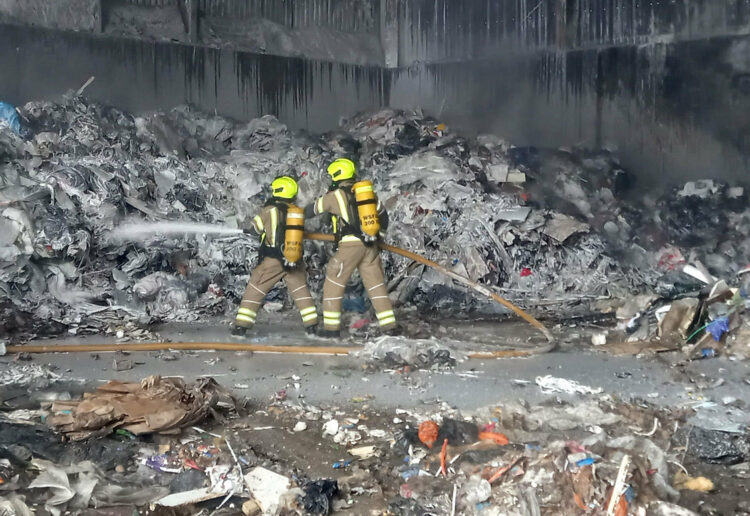Berkshire residents are being urged to correctly dispose of household batteries after findings show that battery-related waste site fires have reached an all-time high.
Research carried out by the National Fire Chiefs Council and Recycle Your Electricals as part of the ‘Stop Battery Fires Campaign’ has revealed that the South East binned nearly 164 million lithium-ion batteries in the past year alone.
“Battery fires in the waste stream often happen with very little warning, leading to unusually intense fires that give off toxic gases and smoke that can have fatal consequences,” said Royal Berkshire Fire and Rescue Service technical support officer Tim Benham.
“If you need to get rid of a lithium-ion battery or an old electrical that contains lithium-ion batteries, don’t dispose of them in your household waste or normal recycling. Damaged batteries can still be dangerous even after you’ve put them in the bin.”
If in doubt with what to do with your old electricals, search for ‘recycle your electricals’ to find your nearest drop off point and advice on what to do.
re3 is a waste management partnership between three councils – Bracknell Forest, Reading and Wokingham Borough Councils. In the last 12 months, re3 has reported 12 fires across the region where the most probable cause is the failure of a lithium-ion battery.
re3 also reports that lithium-ion battery-related fires are increasing year-on-year, with each incident taking between a few hours to several days to put them out.
Laura Fisher, re3 Operational Manager for FCC Environment which manages the facility, says these fires are of growing concern in the region
“The impact of lithium-ion battery fires can be extremely destructive,” she said. “At re3 Transfer Stations, we’ve seen these fires cause significant building damage and the loss of recyclable material. They also pose a great risk to members of staff and local residents, as well as disrupting kerbside collections due to restricted access to waste facilities. Something as simple as recycling your small electricals correctly can go a long way in preventing lithium-ion battery fires.”
One example of a battery-related fire occurred in Reading’s Lennox Road in the morning of Tuesday 20 March. Crews received reports of a vehicle fire, and upon arrival discovered a bin lorry carrying recyclables had caught fire.
They were able to extinguish the flames with two hose reels before inspecting the rubbish to ensure the fire was fully out, taking eight crew members over an hour to take control of the flames. A lithium-ion battery was identified as a possible cause.
“Please make sure that you dispose of your batteries and old electricals properly by taking them to a recycling centre that accepts them,” said Tim. “Remember, if a lithium-ion battery fire starts, do not attempt to put it out. Get out, stay out and call 999.”
Battery fires in bin lorries and at waste sites in the UK have reached an all time high, with over 1,200 in the last year, a substantial increase of 71% from 700 in 2022. 1.6bn batteries were thrown away in the last year – over 3,000 a minute – including over 1.1bn electricals containing hidden lithium-ion batteries.
The National Fire Chiefs Council says that “fires involving lithium-ion batteries are a disaster waiting to happen”, so have launched this campaign to educate people on the importance of correctly disposing of them.
Lithium-ion batteries are hidden inside many everyday household electricals, from laptops, mobile phones and tablets, to electric toothbrushes, vapes and earpods. These batteries can become crushed or damaged in bin lorries or waste sites if they aren’t recycled and can lead to fires at waste centres and in bin lorries across the UK.
When crushed or damaged lithium-ion batteries can be dangerous to the public, waste operators and firefighters as they cause fires that are especially challenging to tackle. They can lead to explosions and chemical exposure, but they create their own oxygen, which means they can keep reigniting, prolonging incidents with smoke and fumes affecting neighbouring areas and communities for long periods of time of up to a week.
Recycle Your Electricals’ executive director Scott Butler wants people to consider the consequences of binning electricals and batteries given that these destructive and costly fires can be easily avoided.
“With more and more products containing lithium-ion batteries, and battery fires on the rise, it’s vital that we stop these fires and reduce the air pollution impact that they have on our local communities and the dangers they present to fire fighters and waste officers,” he said. “ We are also throwing away some of the most precious materials on the planet, which are vital to our economy. We are calling on everyone to make sure that they never bin and always recycle their electricals and their batteries.
The air pollution impact from waste fires has also a significant impact on local communities. Professor Frank Kelly from the Faculty of Medicine, School of Public Health at Imperial College London explains.
“Waste fires can cause significant spikes in air pollution,” he said. “Our analysis of fires at waste sites in the very densely populated areas of Herne Hill and Brentford showed that they contributed to the local pollution burden with the fire in Herne Hill, clearly leading to exceedances in the WHO health based guideline for PM2.5. This meant that thousands of residents in the area were affected, and rightly advised to close windows. Some were unable to leave their homes.
“The health impacts of waste fires, including respiratory issues, are of great concern, and we would advise residents to avoid opening windows at all costs while local air pollution concentrations are elevated and that everyone should wear a mask if they absolutely must venture outside while the fire is burning.”
Recycle Your Electricals is helping make recycling electricals and batteries easier than ever, so more of these fires can be prevented. Batteries, of all kinds, whether loose or hidden in our electricals – should never be binned, always recycled.
If possible, remove batteries from electricals and recycle the batteries and electricals separately at your local recycling centre, supermarket or other battery recycling point. If you can’t remove the batteries, then always recycle your electricals at your nearest electrical recycling point, which you can find using the Recycle Your Electricals Postcode Locator at www.recycleyourelectricals.org.uk/electrical-recycling-near-me/
























